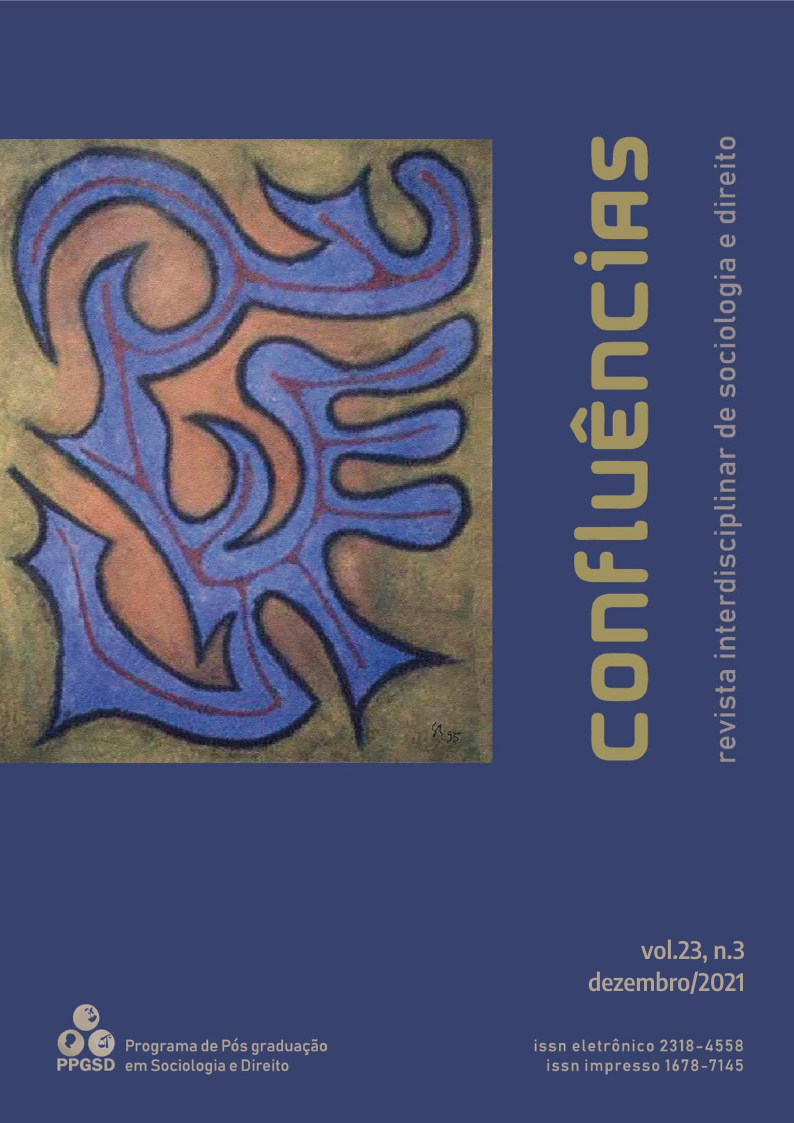THE AUTONOMY OF THE INDIGENOUS PEOPLES 'OWN RIGHTS
AN APPROACH FROM THE LATIN AMERICAN PERSPECTIVE ABSTRACT
DOI:
https://doi.org/10.22409/conflu.v23i3.45471Keywords:
Estado Plurinacional, Multiculturalismo, JusdiversidadeAbstract
This article deals with the theme related to the autonomy of the indigenous legal order from a Latin American perspective, especially in collision with the state legal order, including the fundamental rights defined by the domestic legal order and / or international human rights standards. In the plan of Latin American constitutional law, especially the cross-border Amazonian territory, the proposition of autonomy of the indigenous legal order as a result of the idea of a plurinational state, through a bibliographic approach, which supported the research of the theme from the confrontation with the nation-state model. Said methodology authorized to demonstrate the possibility of extra-state legal autonomy of native collectivity, whose results obtained are linked by the correct notion of unilateral transconstitutionalism of tolerance, with emphasis on the conceptions of self-determination, multiculturalism and jusdiversity.
Downloads
References
ALMEIDA, Maria Regina Celestino de. Os índios na história do Brasil. Rio de Janeiro: FGV editora, 2010. 168 p.
BARRETO, Helder Girão. Direitos indígenas: vetores constitucionais. Curitiba: Juruá, 2014. 152 p.
FAJARDO, Raquel Z. Yrigoyen. El horizonte del constitucionalismo pluralista: del multiculturalismo a la descolonización. In: GARAVITTO, César Rodrigues (Coord.). El derecho em América Latina: um mapa para el pensamento jurídico Del siglo XXI. Buenos Aires: Siglo Veintiuno, 2011.
GRAU, Eros Roberto. Ensaio e discurso sobre a interpretação/aplicação do Direito. 4. ed. São Paulo: Malheiros, 2006.
_____.O direito posto e o direito pressuposto. 7. ed. rev. e ampl. São Paulo: Malheiros, 2008.
KELSEN, Hans. O que é justiça? A justiça, o direito e a política no espelho da ciência. Trad. Luís Carlos Borges. São Paulo: Martins Fontes, 2001.
LOBÃO, Ronaldo Joaquim Silveira. Notas revisadas em favor de um programa de pesquisa de antropologia no direito em contextos de Jusdiversidade, Revista Juris Poiesis, ano 19, n. 20, jun-set, 2016.
MADEIRA FILHO, Wilson; CALLEGARI, José Antonio. Formação do espírito científico interdisciplinar: a produção solidária do conhecimento. Confluências - Revista Interdisciplinar de Sociologia e Direito, Niterói, v. 12, n. 2, ano 2012, p. 193-212.
NEVES, Marcelo. Transconstitucionalismo. São Paulo: Editora WMF Martins Fontes, 2009.
SALGADO, Juan Manuel. El convenio 169 de la OIT: comentado y anotado/Juan Manuel Salgado. 1. ed. Neuquén: EDUCO – Universidad Nacional del Comahue, 2006.
SCHMITT, Carl. Teoría de la Constitución. Madri: Alianza, 1982.
SILVA, José Afonso da. Curso de direito constitucional positivo. 25. ed. São Paulo: Malheiros, 2005.
SILVEIRA, Edson Damas da. Meio ambiente, terras indígenas e defesa nacional: direitos fundamentais em tensão nas fronteiras da Amazônia brasileira. Curitiba: Juruá, 2010. 312 p.
SOUZA FILHO, Carlos Frederico Marés de. O renascer dos povos indígenas para o direito. Curitiba: Juruá, 2018.
WEBER, Max. Economia e sociedade. Vol. 2. 4. ed. Tradução de Regis Barbosa e Karen Elsabe Barbosa. Brasília: UNB: São Paulo: Imprensa Oficial, 2004.
_____. Ciência e política: duas vocações. 18. ed. São Paulo: Cultrix, 2011.
WOLKMER, Antônio Carlos. Pluralismo jurídico: fundamentos de uma nova cultura no Direito. São Paulo: Alga Omega, 2001.
Downloads
Published
How to Cite
Issue
Section
License
Copyright (c) 2021 Raimundo Paulino Cavalcante Filho

This work is licensed under a Creative Commons Attribution-NonCommercial 4.0 International License.







